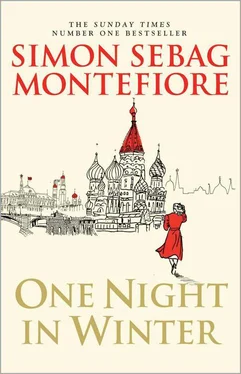SERAFIMA No!
LIKHACHEV You were his favourite pupil?
SERAFIMA Why are you asking me these questions?
LIKHACHEV Because you’re a pretty girl and he’s a fornicator. [Pause.] I have to ask you a question that is sensitive because of its relation to the Head of the Soviet Government. You were acquainted with General Vasily Stalin? Did you and he ever have immoral relations?
A stark, white villa in Babelsberg, Berlin. Stalin lay on a divan identical to the one in his Nearby Dacha in a library filled with the same books and journals. His first meetings with Churchill and Truman were set for later that day and he wore his new generalissimo’s uniform: a white tunic with a single star and golden epaulettes, creased blue trousers with a red stripe, and laced bootkins, instead of the baggy trousers tucked into high boots he generally favoured.
Outside the room, he heard the hum of the headquarters of an empire: motors revved, phones rang, boots clipped on marble floors, young officials bustled, typewriters clattered.
He was not quite alone, however: his son Vasily stood before him in full uniform, almost to attention, as if he was not family at all but a lowly air force general.
‘Sit, sit,’ said Stalin.
Vasily sat nervously.
‘How are you, Vaska?’ Stalin said softly. He was about to ask how Vasily’s poor wife and child were doing but it seemed a waste of time. He knew exactly how they were, and they were not happy.
‘Fine, Father.’
‘As you can see, I’m busy. No one can do a thing on their own, you know. You tell them what to do and they either ignore you or screw it up.’
‘Of course, Father. Only you can decide anything.’
‘You can see I’m weary. Not quite well.’
‘You look very well to me, Father. Congratulations on the new rank, generalissimo.’
‘Pah!’ Stalin waved this aside disdainfully. ‘We’ve got a lot to do here.’ He knew from his British agents that Truman would tell him in the next two days that America had its nuclear bomb and that they would now drop it on Japan. He would pretend that he knew nothing about it. If its awesome power was not exaggerated, he would have to accelerate the Soviet nuclear programme to get his own bomb at breakneck speed. A titanic endeavour. Only his best organizer, Beria, could pull it off… Stalin had won the war, he had toiled sixteen hours a day for four years, sometimes, in the early crises, sleeping on a campbed in his office for days on end. But now he had defeated Germany and conquered half of Europe. And just when he had triumphed, the Americans had got this new bomb and he would have to start all over again. His enemies were still strong and he would have to be harsher, stronger, more vigilant than ever. No one must find out how ill he was.
‘Father…’ Vasily started and Stalin, whose mind had been far away, focused on the sickly, grey face of his son. It was the face of an alcoholic. Like Stalin’s father.
‘Vaska,’ said Stalin, suddenly colder and businesslike. He didn’t have much time and the boy bored, shamed and irritated him in equal measure. What would his late wife Nadya have thought of this pathetic ne’er-do-well? She’d have blamed him, of course. ‘You’ve been mentioned in connection with the Children’s Case. The Chekists say you were chasing Sophia Zeitlin’s daughter. You’re a general now, and a married man. I’ve already cashiered you and demoted you once. Stop chasing skirt, stop drinking. You’re making a fool of yourself and me. They’ll ask you some questions. Answer them properly so I don’t have to hear about this again.’
Vasily hung his head. ‘Yes, Father, I promise. But this case involves Marshal Shako’s daughter, Rosa, and I wanted to talk to you about him.’
‘Go on.’
‘It’s about our fighter planes and how they crash far too often.’
Stalin sat up abruptly: ‘What are you saying?’ Military technology was his own speciality, so if things went wrong, it meant either incompetence or sabotage. Both were crimes.
‘Our planes, specially Yak and MiG fighters, crash seven times more frequently than American Hurricanes or British Spitfires. Many pilots have been killed and there is considerable anger in the air force.’
‘Why haven’t you told me this before?’ Now Stalin was paying Vasily his fullest attention, and Vasily, who seconds earlier had been no more than a delinquent weakling, now basked in the blazing sunlight of his focus.
‘I reported this in full to Marshal Shako and Aircraft Production Minister Titorenko.’
‘Their reaction?’
‘They basically suggested that I conceal the evidence from you. To push ahead with production. To sacrifice more machines and pilots.’
Stalin was furious – he was thinking about those patriotic young pilots crashing in those faulty planes, and the criminals who had sabotaged them. He took a breath. He had to keep calm, preserve himself for his sacred mission in world history.
‘You’re not blackening the name of a Soviet hero like Shako just because he complained to me about your behaviour? That would be unforgivable in my son, Vaska.’
‘No, this is sabotage,’ replied Vasily. ‘Something must be done.’
Stalin immediately saw how this revelation dovetailed neatly into one of his most urgent concerns. Perhaps the boy wasn’t such a fool after all.
He padded to the desk and lifted the special phone to Poskrebyshev who sat outside the door: ‘Get Abakumov back in here.’ He turned to Vasily. ‘Wait outside, boy.’
When Abakumov entered, he bowed to Stalin and slightly less obsequiously to Vasily, who passed him on the way out.
‘Have you visited Hitler’s Chancellery?’ asked Stalin.
‘Yes, Comrade Stalin.’
‘I was planning to take a look but then I changed my mind. Leave that to Churchill and Truman. Comrade Stalin doesn’t make tours.’
He told him about Vasily’s allegations. ‘Check out Shako and Titorenko. Do whatever you need.’ Abakumov knew that when Stalin said, ‘Check out,’ he meant, ‘Arrest.’
‘Their children are mixed up in the Children’s Case,’ said Abakumov.
‘Oh, those poor children.’ Stalin lit a cigarette and the fingers of blue smoke curled themselves around him. ‘But they have to be punished. Their families could well be rotten to the core.’
‘Comrade Stalin, Comrade Satinov is in charge of the aircraft industry. Should I check him out?’
‘No. Find out what you can. A bit of pressure won’t do any harm. Do we have Comrade Satinov’s attention? If he’s guilty he’ll answer to the Central Committee, but he’s a hard-working comrade.’ Stalin paused, deep in thought. ‘You know some of our generals behave as if they won the war on their own.’
‘You won the war, Comrade Stalin,’ said Abakumov.
Stalin scowled at him. ‘Don’t talk nonsense, Abakumov. The people won the war, the people.’
‘Yes of course, Comrade Stalin, but many of our generals are corrupt. Their heads have been turned by titles and applause. Their apartments are filled with paintings, rugs and furniture brought in trains from all over Europe.’
Stalin grunted his agreement. ‘We Bolsheviks don’t tolerate corruption. Get back to Moscow and take off the silk gloves. Check out the generals and mount your prisoners at once. Vasily says pilots barely dare fly their planes at present. A crime.’
Stalin half closed his eyes. Abakumov was a blockhead, but this time, he seemed to have understood his coded semaphores. Didn’t all the heroes of history – Genghis Khan, Ivan the Terrible, Nadir Shah, Napoleon – talk in riddles?
Abakumov saluted. ‘I’ll report, Comrade Stalin.’ He headed for the door.
‘Oh, and Comrade Abakumov?’ The Chekist turned back. ‘When I was a boy at the seminary, I was always curious about my friends, so I studied their parents. I could learn everything about the parents by talking to the children. Remember this, won’t you, when you’re back in Moscow?’
Читать дальше












